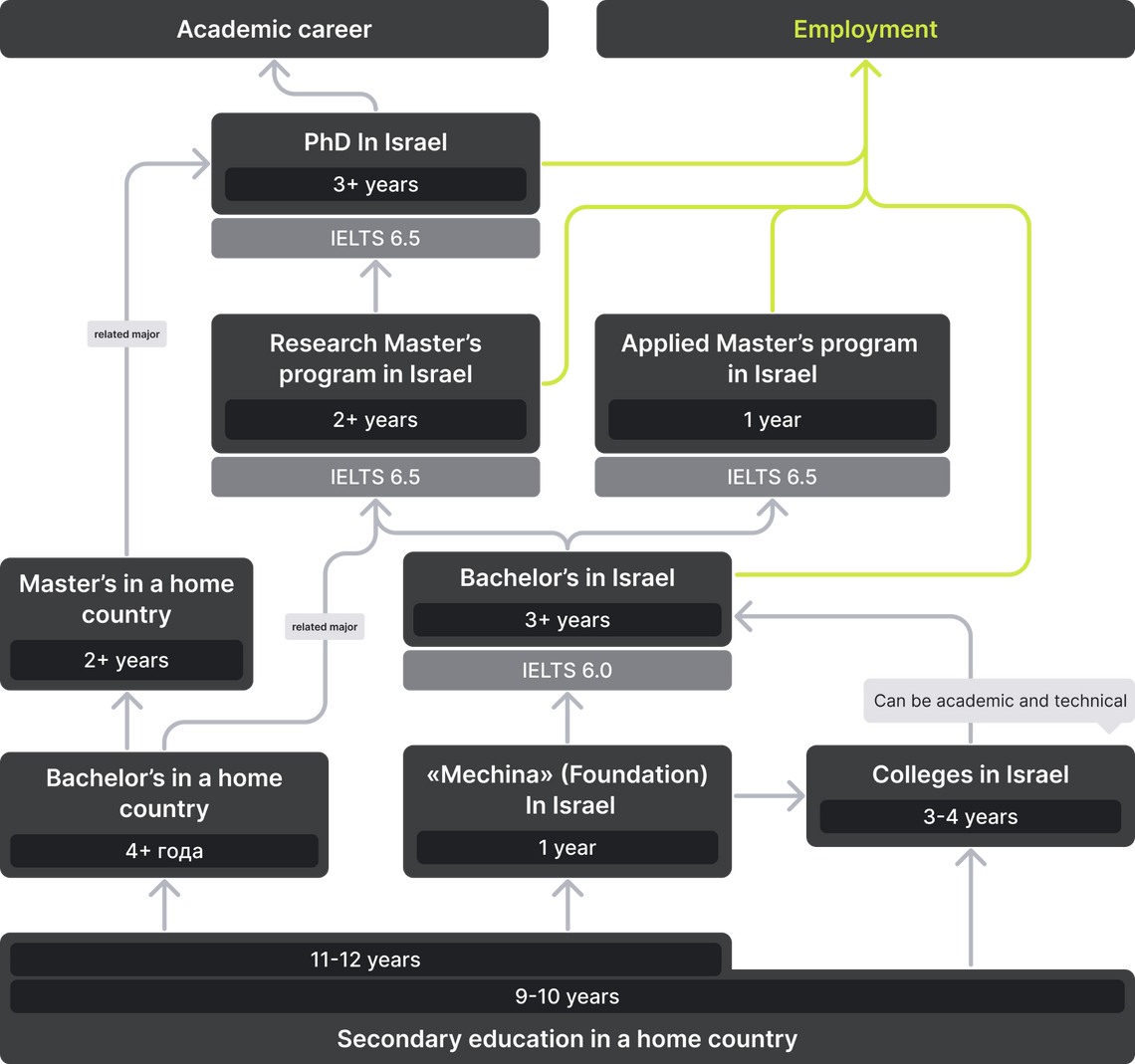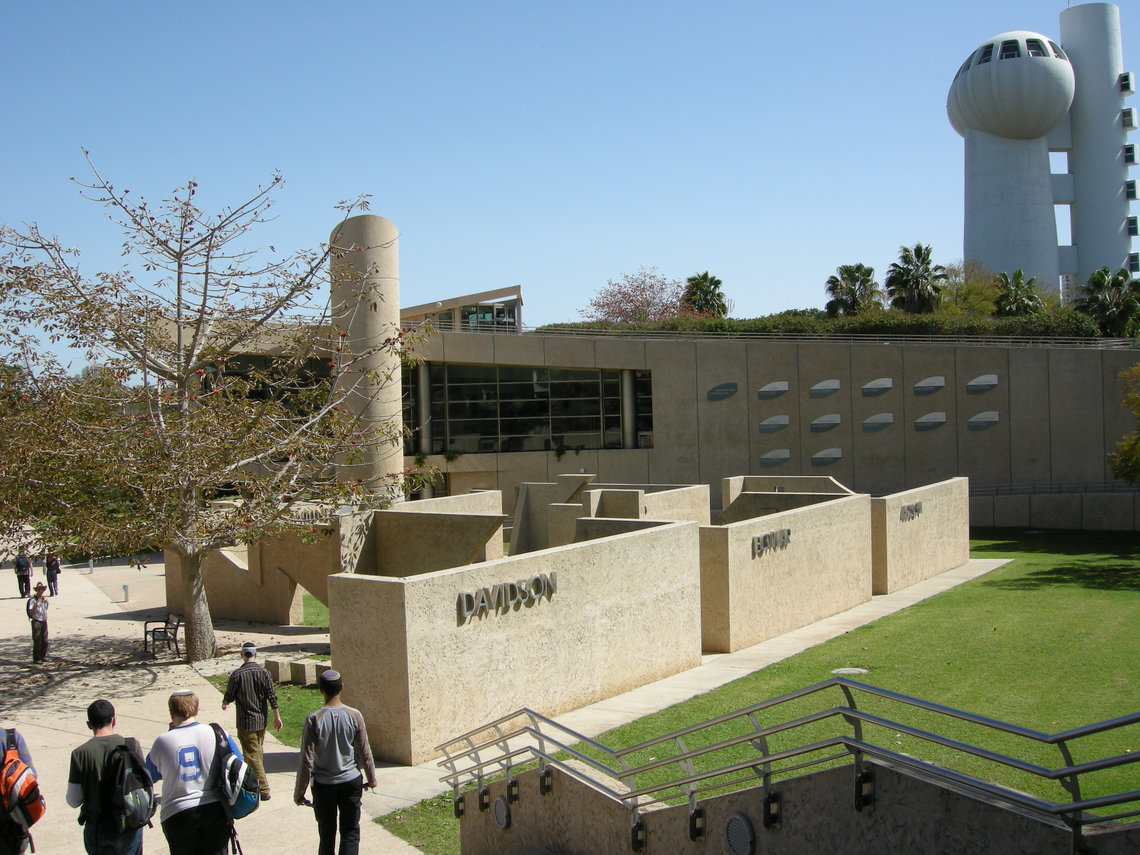Apply to a foreign university with confidence
- Properly fulfilled documents
- Perfect motivation letter
- Support from a personal mentor
- Offers from several universities
Enrollment at a university in Israel is not possible after the 11th grade. Secondary education in the country lasts 12 years. Therefore, foreign applicants either have to study at a university in their home country or go through a preparatory program for a year in order to compensate for this yearly difference.
Free consultation




Enrollment at a university in Israel is not possible after the 11th grade. Secondary education in the country lasts 12 years. Therefore, foreign applicants either have to study at a university in their home country or go through a preparatory program for a year in order to compensate for this yearly difference.
Read more about the Israeli higher education system and universities in our separate articles.
| Program | Age | Duration | Min. cost | Avg. cost |
|---|---|---|---|---|
| Preparatory language courses | 16+ | 2-6 weeks | 1,500 USD/course | 2,500 USD/course |
| University preparation | 16+ | 1 year | 4,000 USD/year | 12,000 USD/year |
| Bachelor's | 18-27 | 3-4 years | 3,000 USD/year | 13,000 USD/year |
| Master's | 20-30 | 1-3 years | 5,000 USD/year | 16,000 USD/year |
| MBA | 20-30 | 1-2 years | 9,500 USD/year | 20,000 USD/year |
| PhD | 20+ | 3-6 years | Free / 1,200 USD/year | 10,000 USD/year |
| Expense | Average cost |
|---|---|
| Hostel | 3,000-6,000 USD/year |
| Food | 600 ISL/month |
| Rent | 3300 ISL/month |
| Visa | 46 USD |
| Insurance | 250 USD/year |
All prices and requirements must be specified on the official websites of universities.


In Israel, you can receive higher education at:
Rankings are suitable for the first stage of "screening out" universities. However, it is important to choose the proper type of ranking. For example, QS World University Rankings focuses more on the reputation of universities among teachers and students. According to QS, the Hebrew University of Jerusalem ranks 222nd in the world. It is followed by Tel Aviv University (260) and Technion-Israel Institute of Technology (408).
The picture will be different if you look at the ARWU rankings — the system primarily takes into account the scientific activity of a university. Here, the Hebrew University of Jerusalem is in 90th place. It is followed by the Weizmann Institute (92) and Technion (94).
This is a key criterion when choosing a university. It is important to determine which university is the strongest in your specialty. Subject ratings will help with this. Here are the best Israeli universities in certain areas:
In Israel, entry requirements for bachelor’s programs differ depending on the university. For instance, the minimum IELTS score at Technion is 6.0, while Bar-Ilan University requires 6.5.
When applying to a master's program, you may need GRE or GMAT results.
Therefore, when choosing a program, you should directly contact the admissions office of your chosen university and clarify the entry requirements.
Education in Israel mainly takes place in the Hebrew language. By all means, only 4 bachelor's and 19 master's programs are taught in English at Tel Aviv University[6], while the rest are in Hebrew[7]. The same goes for the programs at Bar-Ilan[8] and the Hebrew University[9]. On the contrary, more programs in English are offered at the Weizmann Institute[10].
The language you want to study in will greatly influence your choice and preparation for admission. However, even if you choose Hebrew programs, you will still need to know English. Many universities include it as a mandatory requirement[11].
Items 1-6 of 58
Advanced search
Enrollment at Israeli universities is only possible after numerous tests, exams, and preparatory courses. Usually, 11 months pass from the application date to university admission.
It is impossible to enter an Israeli university if you have only finished 11 grades, given that secondary education lasts 12 years in the country. As such, you have two options:
In both cases, upon admission, you will need:
*Some universities require knowledge of English at the A2-B1 level, even for programs in Hebrew.
To enter a Mechina program, you need an A2 level of Hebrew. If you do not at all know the language, you will have to take a summer language course at an ulpan. Courses last from 2 to 6 months and cost 1,500-2,500 USD.
Sometimes, universities ask prospective students to take an ulpan course even if they have already made up the yearly difference in education.
A psychometric exam is required for admission to bachelor’s programs. It tests knowledge of English, Hebrew, core subjects, and logic. Students can score from 200 to 800 points, where 400 is a passing score. A "brilliant" score starts at 750 points, with which you can enroll at medical colleges — universities with the highest level of competition.
The psychometric test can be taken in Hebrew, English, Russian, or Arabic. If you do not score the necessary points the first time around, retakes occur every six months.
Some universities require SAT or ACT scores instead of a psychometric test. GRE or GMAT scores may be required for master’s programs. Checking the exact requirements on the website of your chosen university.
In Israel, most foreign qualifications must be legalized. Diploma recognition is required for admission to bachelor's, master's, and doctoral programs.
Some documents go through a simple system of legalization: it is enough to translate them into Hebrew and notarize them. This happens with diplomas of secondary and vocational education.
Academic bachelor's and master's degrees must go through a recognition process. To do so, you need to register with the Department for the Recognition of Foreign Academic Titles and Degrees, where you fill out a form and attach the necessary documents.
Israeli universities have their own requirements for the assessment of foreign diplomas. Therefore, check with the admissions office on whether you need to legalize your documents, or if they can simply be translated and notarized.
Preparatory programs in Israel are called Mechina. They are attended by foreign students who need to improve their knowledge of Hebrew or English and compensate for any academic differences.
Prior to enrollment, prospective students need to complete 5 weeks of a language course at an ulpan. However, if you have at least a Bet (A2) level of Hebrew, then you can immediately enter a preparatory program.
Mechina programs can be completed at three universities and one academic college:
Some universities, such as the Hebrew University of Jerusalem, accept Mechina graduates without a psychometric test.
To enter a preparatory program, you need to:
Required documents:
This is an approximate list of documents. Full requirements should be specified on the website of the chosen program.
| University | Deadlines |
|---|---|
| Bar-Ilan University |
|
| Hebrew University of Jerusalem | Until June 30 |
| Technion | Check with the admissions office |

Israel does not have a centralized application system like the Netherlands or United Kingdom. Therefore, each university handles applications separately.
Applicants register on the university website, fill out an application form, and attach a photo and copy of their passport. The rest of the required documents are sent by email.
You will not be accepted into a bachelor’s program if you have only completed 11 years of secondary education. It will be necessary to compensate for the missing year through the Mechina preparatory program, which is advisable to complete at the university chosen for your bachelor's studies. If the university does not offer a Mechina program, contact the admissions office and ask which universities they cooperate with.
You must complete 2 to 6 weeks of summer courses at an ulpan before you can enroll in a preparatory program. This is a necessary measure in order to learn Hebrew up to the required Bet (A2) level. If you already know the language, then you do not need to take an ulpan course. As such, you can learn Hebrew on your own to save 2,000 USD.
Another option is to pursue a related bachelor’s program in your home country for one year. But even after that, you may be asked to take a summer course at an ulpan. This requirement is often found in humanities programs.
Applicants also have to take a standardized exam — usually, a psychometric test. It includes tasks in English and tests for quantitative and verbal thinking. The passing score depends on the university, but the minimum threshold is 400.
Psychometric tests are a prerequisite for programs in Hebrew. They are also accepted for bachelor’s programs in English. Some universities, such as Technion, instead ask for SAT or ACT[13] results.
This is an approximate list of documents. Full requirements should be specified on the website of the chosen program.
Deadlines for document submission should always be clarified with the admissions office or university website. Universities have general application deadlines, but some programs may differ.
| University | Deadlines |
|---|---|
| Reichman University | End of October — July 15 |
| Tel Aviv University | January 17 — May 1 |
| Technion | Until June 1 |
| Haifa University | Until May 31 |

The admission process for master’s programs is the same as for bachelor’s programs. You need to register on the university website, fill out an application, and send in the necessary documents.
Prior to that, you must legalize your bachelor's degree. To do so, you need to register with the Department for the Recognition of Foreign Academic Titles and Degrees, fill out an application, and attach the necessary documents — usually, this is a diploma and a grade transcript[14].
In Israel, there are two types of master’s programs:
The requirements for admission to these programs differ from one another: applied programs often require work experience in the chosen field.
If you enter a new field that is not related to your bachelor's degree, then the university will send you to a supplementary program[15]. It makes up for the academic difference. The duration depends on how many additional subjects you need to learn.
Depending on the university, there are other requirements:
Each university has its own admission requirements. Check the exact list of documents with the admissions office or university website.
Check the deadlines on the website of the university or at the admissions office. Some programs may have different deadlines.
| University | Deadlines |
|---|---|
| Reichman University | November 15 — August 31 |
| Tel Aviv University | January 17 — May 1 |
| Haifa University | Until May 31 |
| Technion | Until February 1 |
| Weizmann Institute | Until February 28 / March 15 / March 31 |
Basic requirements for admission:
Also, depending on the university:

Only students who have defended their master’s thesis can enter a doctoral program. Therefore, it is impossible to enroll in PhD programs with an applied master’s degree, as students do not write a thesis. To enroll, you must complete a special training course and write a thesis.
Most admissions committees do not consider candidates whose average GPA was below 80% or who received below 85% for their thesis defense. But, there are exceptions — in rare cases, Israeli doctoral programs admit applicants who have not yet received a master's degree due to low grades. This is possible at Ben Gurion University — but only if the commission likes your research proposal.
Before submitting documents for a doctoral program, the applicant must find a supervisor. Information on supervisors is usually available on the faculty website of the chosen university. You can also download a request letter template there. When you have received a signed consent form from your supervisor, send it along with the rest of the required documents by email to the university.
Check the exact list of documents with the admissions office or university website.
| University | Deadlines |
|---|---|
| Hebrew University of Jerusalem | Until January 31 |
| Tel Aviv University | January 17 — May 1 |
| Technion | Until February 1 |
| Haifa University | Until May 31 |
| Weizmann Institute | Check with the admissions office |
Israel offers more than 30 types of scholarships and grants. They can be obtained in different ways:
Scholarship sizes vary. For example, the state can fully pay for the education of new repatriates, while Global Education scholarship holders receive from 15,000 USD per year.
The main requirements include:
You should look for scholarships on the websites of universities. For example, Technion, Hebrew University of Jerusalem, and Tel Aviv University provide students with need-based scholarships. The amount of the scholarship is determined individually depending on the situation.
One of the most popular independent scholarships is from Mifal HaPais. In exchange for funding education, students teach pensioners how to use technology, accompany them on walks, and deliver food and medicine. The scholarship lasts three years, at 10000 ISL a year..

To study in Israel, you need an A/2 student visa. To get it, you need to personally submit documents to the Israeli embassy and pay a visa fee of 46 USD. The term of consideration is from 5 days to 2 weeks.
A student visa is valid for a year. It allows you to repeatedly enter and leave the country. When the validity period ends, you can renew the document in Israel[16].
Required documents for a student visa:
60+ countries
we work with
$1,000,000 saved
by students through scholarships
6,400 offers
our students got